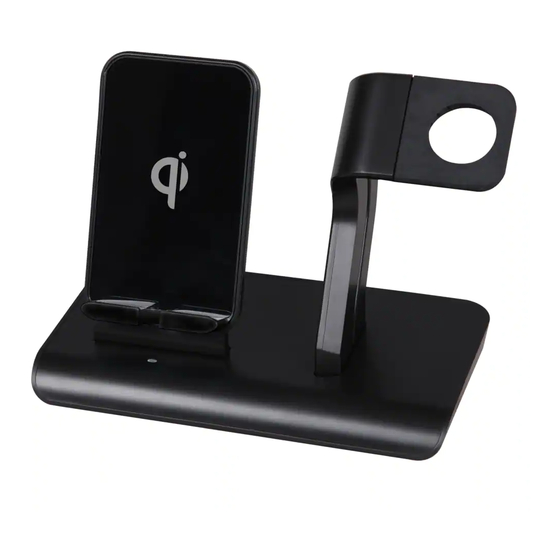Advertisement
Wireless Charging Station with
Built-in Smart Watch Holder
This charging station allows you enjoy wireless charging easily. Please read
the user manual before using and keep it for future reference.
Specifications:
Input: DC 5 V 2 A
Wireless output: 5 V 1 A
USB output: 5 V 1 A
Frequency: 110–205 kHz
Charge efficiency: 65%
Charging distance: ≤ 8 mm
User manual
Model No. 035-7316-6
Advertisement
Table of Contents

Summary of Contents for BlueHive 035-7316-6
- Page 1 Wireless Charging Station with Built-in Smart Watch Holder User manual Model No. 035-7316-6 This charging station allows you enjoy wireless charging easily. Please read the user manual before using and keep it for future reference. Specifications: Input: DC 5 V 2 A...
- Page 2 Smart watch charger and cable: Base INSTRUCTIONS: 1. Place the Smart Watch onto the arm 2. Firmly press the charging cable into the route 3. Run the remaining cable through the slot 4. Firmly press the arm into the base 5.
- Page 3 Connecting to power supply: 1. Connect USB 2.0 port to the power adaptor (or connect to laptop), and micro USB port to the wireless charging dock. 2. The LED indicator will turn to green, entering into standby mode. USB output Micro USB Input Port...
- Page 4 Charging function: 1. Make sure the wireless charging dock is connected to a power supply, and is in standby status. 2. Put the QI-enabled smart phone on the dock, LED indicator turns to blue for charging. When the phone is fully charged, the LED indicator will turn to green.
- Page 5 Warning: 1. Do not squeeze or drop the charging station. 2. Do not disassemble or throw into fire or water to avoid causing short circuit leakage. 3. Do not use wireless charger in hot, humid or corrosive environments to avoid damage. 4.



Need help?
Do you have a question about the 035-7316-6 and is the answer not in the manual?
Questions and answers